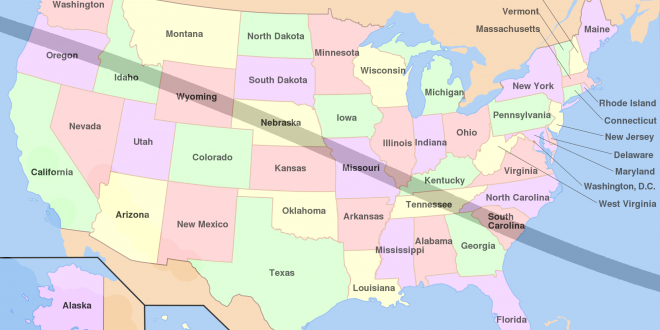This month VSU will witness something that hasn’t been seen in the continental U.S. since 1979, but we’ll have to look carefully.
On Aug. 21 around 1 p.m., the VSU community will be able to view the beginnings of a solar eclipse as the path of totality moves across our surrounding states and through the northeast corner of Georgia. The last time Georgia hosted a total eclipse was in 1970, when the path of totality lie over Savannah.
Eclipses come in “seasons” of about 31 to 37 days every six months. During this time, both solar and lunar eclipses are possible, though according to NASA a solar eclipse only occurs every 18 months. Solar eclipses follow a set path along the earth called the path of totality, where the moon’s shadow passes directly over.
Other cities near the path of totality, like Valdosta, will only enjoy a partial eclipse. Though at its maximum, the sun will be about 90 percent eclipsed. Looking at a partial eclipse can result in blindness, but those in the path of totality may enjoy looking up at the total eclipse without protection.
In Valdosta, anyone hoping to view the partial eclipse will need to purchase a pair of eclipse glasses from a reputable dealer or use the pin-hole method.
“One can directly view the eclipse by making a pinhole in a small sheet of cardboard, like an index card, and letting the Sun’s light pass through it onto a second card.” Dr. Kenneth Rumstay, professor of physics and astronomy, said. “The pinhole acts as a tiny lens, focusing the sun’s image.”
The community may also attend a viewing party held by the department of physics, astronomy and geosciences. According to Rumstay, attendees will be provided with special glasses and may look through telescopes equipped with solar filters for a magnified view.
“We’ll be set up on the sidewalk in front of Odum Library with a few telescopes and nearly 200 eclipse glasses,” said Rumstay. “With those we’ll see the Moon silhouetted in front of the Sun, but even at mid-eclipse the sky won’t be noticeably darker.”
The department recommends traveling to view the total eclipse, but it could be difficult. During a planetarium show over the eclipse in April of last semester, professor of astronomy Dr. Martha Leake said that some hotels along the center line were already completely booked. Because the eclipse will fall during the afternoon, Georgia’s weather patterns may also block the view.
To learn more about our solar system, click here .
Written by Kelsey Dickerson, Editor-in-Chief. Photos courtesy of wikicomons.
 The Spectator The independent student newspaper of Valdosta State University
The Spectator The independent student newspaper of Valdosta State University





